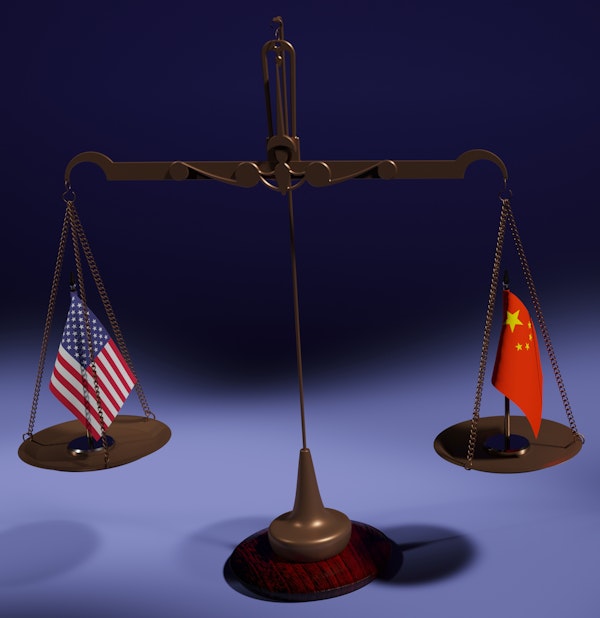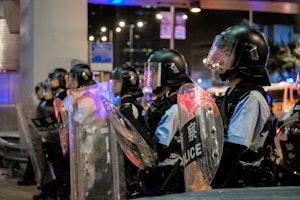On Strategy and Security with China
COVID-19, ongoing human rights violations, and shifting U.S. international policy have further complicated an already-volatile formula between the U.S. and China.

Sheena Chestnut Greitens is an associate professor at the LBJ School of Public Affairs at the University of Texas, where she focuses on East Asia, American national security, and authoritarian politics and foreign policy. Her work on China and North Korea has been published extensively, and she’s testified on security issues before Congress. She previously served as the first lady of Missouri, where she helped lead the state’s 2017 trade mission to China and South Korea.
The Bush Institute talked with Greitens recently about the complicated U.S.-China relationship, the impact of COVID-19, alarming human rights violations, and the ongoing struggle for influence.
Where does the balance of power lie right now between China and the U.S.?
The United States and China are the two most powerful and influential countries in the world, and right now, we’re at a moment when I think both countries are revisiting some major assumptions about what the U.S.-China relationship should look like.
Under Xi Jinping, China has moved to a more assertive role in global leadership, and has moved to advance its interests in a whole range of areas from the South China Sea to technological standards-setting in multilateral institutions to Xinjiang, even when that has risked increased confrontation with other countries.
The United States is also, I think, grappling right now with what global leadership means and how the country will approach its role in the world. So, the balance has always been a mix of competition and cooperation, but right now that mix is very much in flux.
The balance has always been a mix of competition and cooperation, but right now that mix is very much in flux.
How has COVID-19 impacted U.S. relations with China, and what role does the U.S. play now in leading through a global health crisis — or does it?
What we’ve seen recently is that the COVID-19 pandemic has lowered trust and approval of China in significant ways across the political spectrum in the United States. That downturn came at a time when positive feelings toward China were already at a low due to tensions over security, trade, and human rights.
 Citizens in Chengdu, Sichuan, China wear masks on the street on January 23, 2020. (Ihor Sulyatytskyy / Shutterstock)
Citizens in Chengdu, Sichuan, China wear masks on the street on January 23, 2020. (Ihor Sulyatytskyy / Shutterstock)
The pandemic has deepened those concerns in the United States, but it has also prompted an active debate within the United States about our own leadership role in global health. The next administration will play a pivotal role in defining how the U.S. engages and leads on global health — so it’s something we’ll have to watch closely in the coming months.
What we’ve seen recently is that the COVID-19 pandemic has lowered trust and approval of China. … The next administration will play a pivotal role in defining how the U.S. engages and leads on global health.
Recently, the U.S. consulate appeared to reject student asylum-seekers in Hong Kong. What’s really going on here?
Under international law, consulates are not required to shelter people who are applying for refugee status or asylum, and many of them aren’t physically and logistically set up to do so. My guess is that the consulate in Hong Kong probably wanted to avoid physical confrontations or incidents with the Hong Kong police over asylum-seekers trying to enter consulate grounds, which has happened previously with North Koreans who were trying to seek refuge at embassies or consulates in other locations in China.
But the United States has also opened a pathway for people fleeing persecution in Hong Kong to come to the United States under our refugee admissions process, which is an important symbolic and practical gesture after the passage of the Hong Kong National Security Law this summer. We know from the North Korea Human Rights Act signed by President Bush that after legislation is signed, there’s still work to be done to actually get people cleared and into the United States for resettlement. So, the next step is to make sure that people who need to leave Hong Kong can actually navigate the process and get to the United States if they apply to do so.
What should the U.S. be doing to address human rights violations in China?
Unfortunately, there isn’t just one area of concern on the human rights front right now, and so a lot of different steps could be taken in different areas. The mass detention and re-education of Uighur and other religious and ethnic minorities in China is obviously a major source of concern, as is the overall tightening that we’ve seen inside China as a result of Xi Jinping’s new approach to internal and national security.
The mass detention and re-education of Uighur and other religious and ethnic minorities in China is obviously a major source of concern, as is the overall tightening that we’ve seen inside China as a result of Xi Jinping’s new approach to internal and national security.
 This photo, taken on May 31, 2019, shows the outer wall of a complex that includes what is believed to be a re-education camp where mostly Muslim ethnic minorities are detained on the outskirts of Hotan, in China's northwestern Xinjiang region. (Greg Baker / AFP via Getty Images)
This photo, taken on May 31, 2019, shows the outer wall of a complex that includes what is believed to be a re-education camp where mostly Muslim ethnic minorities are detained on the outskirts of Hotan, in China's northwestern Xinjiang region. (Greg Baker / AFP via Getty Images)
One of the areas I work on is China’s growing export of surveillance technology to countries around the world. These exports raise issues with data security, the role of technology in U.S.-China competition, and human rights and democratic freedoms. I’ve argued that the U.S. really needs to come up with a coordinated strategy to address this issue, because there are a lot of moving pieces and a lot of different U.S. government agencies involved.
That strategy needs to acknowledge that countries that consider adopting this technology may have real concerns (such as violent crime) that they need to address, and really take those interests and concerns seriously to try to find a solution. Plus, even if a country can’t remove all Chinese technology from its systems, the U.S. should still be willing to work with countries to create technical and legal measures that can protect data privacy and data security, as well as civil liberties and democracy.
What comparisons can be drawn between North Korea and the increasingly alarming actions taken by the authoritarian regime in China?
Increasingly, both countries are difficult for the United States to understand because our access is limited. That’s always been true of North Korea, but it’s more and more true of China these days. As a researcher and a teacher who trains policymakers, I’m really thinking hard about how we can ensure that our understanding of both countries is as good as possible — and that’s very challenging at the moment.
What’s Taiwan’s role right now, and how can the U.S. better support the democratic stronghold?
Taiwan provides a really interesting and important example of how democracies can deal with COVID-19 without compromising their democratic values, processes, and institutions. In addition to providing Taiwan with “arms of a defensive character” and maintaining the U.S. ability to resist coercion that might be aimed at changing Taiwan’s status, both of which are codified in law under the Taiwan Relations Act, the United States could partner with Taiwan to share lessons learned from Taiwan’s experience with pandemic management, and in particular, the tools that Taiwan used to ensure that pandemic response was compatible with democracy, civil liberties, and human rights.
The United States could partner with Taiwan to share lessons learned from Taiwan’s experience with pandemic management, and in particular, the tools that Taiwan used to ensure that pandemic response was compatible with democracy, civil liberties, and human rights.
The Catalyst believes that ideas matter. We aim to stimulate debate on the most important issues of the day, featuring a range of arguments that are constructive, high-minded, and share our core values of freedom, opportunity, accountability, and compassion. To that end, we seek out ideas that may challenge us, and the authors’ views presented here are their own; The Catalyst does not endorse any particular policy, politician, or party.
-
Previous Article The Impact of U.S.-China Competition on the American Alliance System An essay by Victor Cha, Senior Fellow in the Human Freedom Initiative at the Bush Institute
-
Next Article Trade as a Pathway to Peace An essay by Hiroki Takeuchi, Director of the Sun and Star Program on Japan and East Asia at SMU's Tower Center for Public Policy and International Affairs


